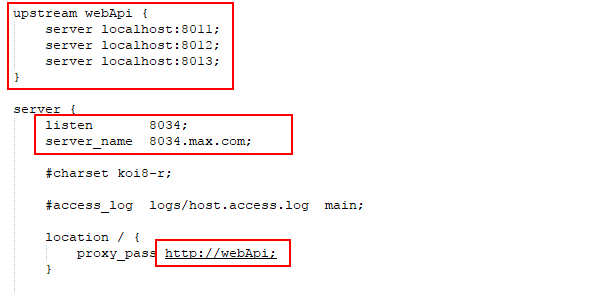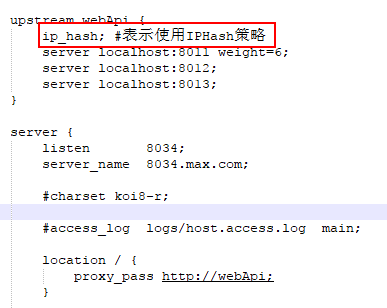01-Nginx 实现负载均衡
随着互联网不断发展,单应用单服务器有时候很难满足需求。比如京东、淘宝在面临双11的时候,处理程序肯定不会是一台服务器。那么Nginx 可以实现多服务器共同分担服务器压力问题。
Nginx可以做正向和反向代理。但是实际工作中。应用反向代理的较多。Nginx 地址
一、启动Nginx
你可以使用DOS 命令符启动服务,也可以直接双击 Nginx.exe 直接启动服务
启动服务:start nginx
退出服务:nginx -s quit
强制关闭服务:nginx -s stop
重新载入服务:nginx -s reload (比如配置文件发生的改变,使用此命令,服务不会停止,是新的配置生效)
验证配置文件:nginx -t
使用配置文件:nginx -c "配置文件路径"
使用帮助:nginx -h
二、通过 修改 配置 访问 webapi
01、新建 WebApi 项目,在IIS 上部署,地址:localhost:8011
02、修改配置文件

03、这时候在浏览器上输入 localhost:8034 就会转发到 localhost:8011服务器上
三、多服务器实现负载均衡
01、轮询策略
之前我建立了一个端口号8011的api,现在新建8012、8013端口号的api,实现负载均衡。
修改配置文件

这样配置实际上实现了简单的轮询策,记住 upstream 取得名字 webapi 那么 proxy_pass 中名称要对应,这样 通过访问 localhost:8034 找到 http://wenpai -> upstream 中服务地址列表
02、权重策略
You can you up,你行你来,在负载均衡的服务器中,由于你的性能比较优秀,那么你可以多承担一点访问量。这时候你可以使用权重策略。只要在 其后加 weight=1(默认) weight (小写) 即可

补充:可以在加其他参数:
down 表示当前的server不参与负载
weight 默认1,weight 值越大,表示负载的权重越大
max_fails 允许请求失败的次数默认1,当超过最大次数时,返回 proxy_next_upstream 模块定义的错误
fail_timeout max_fails 次失败后,暂停的时间
backup 其他所有的非backup机器down或者忙的时候,请求backup机器,所以这台机器压力最轻松。
03、ip_hash 策略

完整的配置信息:
#user nobody;
worker_processes 1;
#error_log logs/error.log;
#error_log logs/error.log notice;
#error_log logs/error.log info;
#pid logs/nginx.pid;
events {
worker_connections 1024;
}
http {
include mime.types;
default_type application/octet-stream;
#log_format main '$remote_addr - $remote_user [$time_local] "$request" '
# '$status $body_bytes_sent "$http_referer" '
# '"$http_user_agent" "$http_x_forwarded_for"';
#access_log logs/access.log main;
sendfile on;
#tcp_nopush on;
#keepalive_timeout 0;
keepalive_timeout 65;
#gzip on;
upstream webApi {
ip_hash; #表示使用IPHash策略
server localhost:8011 weight=6;
server localhost:8012;
server localhost:8013;
}
server {
listen 8034;
server_name 8034.max.com;
#charset koi8-r;
#access_log logs/host.access.log main;
location / {
proxy_pass http://webApi;
}
#error_page 404 /404.html;
# redirect server error pages to the static page /50x.html
#
error_page 500 502 503 504 /50x.html;
location = /50x.html {
root html;
}
# proxy the PHP scripts to Apache listening on 127.0.0.1:80
#
#location ~ \.php$ {
# proxy_pass http://127.0.0.1;
#}
# pass the PHP scripts to FastCGI server listening on 127.0.0.1:9000
#
#location ~ \.php$ {
# root html;
# fastcgi_pass 127.0.0.1:9000;
# fastcgi_index index.php;
# fastcgi_param SCRIPT_FILENAME /scripts$fastcgi_script_name;
# include fastcgi_params;
#}
# deny access to .htaccess files, if Apache's document root
# concurs with nginx's one
#
#location ~ /\.ht {
# deny all;
#}
}
# another virtual host using mix of IP-, name-, and port-based configuration
#
#server {
# listen 8000;
# listen somename:8080;
# server_name somename alias another.alias;
# location / {
# root html;
# index index.html index.htm;
# }
#}
# HTTPS server
#
#server {
# listen 443 ssl;
# server_name localhost;
# ssl_certificate cert.pem;
# ssl_certificate_key cert.key;
# ssl_session_cache shared:SSL:1m;
# ssl_session_timeout 5m;
# ssl_ciphers HIGH:!aNULL:!MD5;
# ssl_prefer_server_ciphers on;
# location / {
# root html;
# index index.html index.htm;
# }
#}
}



 浙公网安备 33010602011771号
浙公网安备 33010602011771号